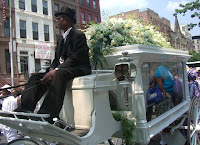





 National Black Theatre - Welcome
National Black Theatre - Welcome contact NBT
By GLENN COLLINS
Published: New York Times / July 29, 2008
It could not be mistaken for a New Orleans funeral procession — hey, this wasn’t just New York City, this was Harlem. And so the memorial send-off on Monday to celebrate a force in black theater became a theatrical neighborhoodwide parade honoring Barbara Ann Teer, the founder of the four-decades-old National Black Theater, who died last week at the age of 71.
How theatrical? Before the encomiums and songs and reminiscences and invocations at Riverside Church in Manhattan, there was a release of doves. There was a mile-and-a-half-long walk through Harlem. There was an advance processional guard of 40 African drummers. There was a horse-drawn carriage bearing the coffin. And, yes, there was an elephant.
Then, just in case anyone was feeling too very sad, fireworks were presented by the Grucci family at a barge on the Hudson River.
“Barbara championed our culture,” Basil A. Paterson, former state senator and deputy mayor, said before a crowd of nearly 700 that filled the church for more than three hours into Monday evening. “And the culture of an oppressed people has to be important — or they wouldn’t have survived.”
The triumph of survival was an important theme throughout the day — and indeed, the colorful, drum-driven march of 350 celebrators stretched over two blocks was titled “The Soul Journey of Love Processional.”
The hourlong march was a happy bedlam of chants, cheers, drumbeats and song, and was boisterous enough to set off a few car alarms as it snaked from the theater at Fifth Avenue and 125th Street westward through Harlem to the church, growing in size as it grew in momentum.
The ecstatic participants saluted the Apollo Theater as they passed by on 125th Street when the marquee flashed “In Memory of Dr. Barbara Ann Teer 1937-2008.” She referred to herself, and was known to people in Harlem, as Dr. Teer.
About the elephant? “She was very fond of elephants, especially with their trunks up,” said Debra Ann Byrd, a producing associate at the National Black Theater, who recalled that Ms. Teer “even had elephant earrings.”
At the church on Riverside Drive at 120th Street, Roberta Flack played the piano and sang a song of hope that, she said to the crowd, was “from Barbara to you.” The lyrics included the words “you make the dark clouds roll away,” and brought tears to many eyes in the crowd.
Representative Charles B. Rangel memorialized “that smile, that unforgettable, beautiful, everlasting smile.” He added, “Whenever it’s time for me to go, I want to be with her.”
Ms. Teer, a Harlem fixture who served as nurturer, gadfly and inspirational mother superior, was a passionate, articulate advocate for black culture and black artists, speakers said. And her life was a celebration of being “free, open and black,” as she used to put it.
The actress Hattie Winston said during the service that Ms. Teer had “the backbone of an African princess.”
Indeed, Ms. Teer’s Hawaiian name — given to her in a traditional ceremony described during the memorial service — is translated as “the woman with the voice of authority who calls the rain.”
The theater she founded in 1968 produced entertainment, art exhibitions and special events, and toured the world from its home base in a building that Ms. Teer had led the theater in purchasing at 2031 Fifth Avenue.
“We would all have wanted for more years to enjoy her company,” former Mayor David N. Dinkins said.
He added, “The most telling tribute to her success is the presence here today of so many of those who were touched by her life.”
Her role, many others said at the service, was transformational, and some used strong words in describing Ms. Teer’s struggle to keep black theater alive in the city.
To applause and shouts, Woodie King Jr. of the New Federal Theater in Manhattan honored her “40 years of fighting this vicious, racist system to keep the institution going.”
Others drew laughter from the crowd as they described Ms. Teer’s flamboyant style and crowded schedule. “This leaving is too abrupt, too unanticipated,” said the actress Ruby Dee of the passing of Ms. Teer. “Perhaps she needed to staff some meeting.”
And Mr. Paterson, who is the father of Gov. David A. Paterson, got a laugh when, in mentioning Ms. Teer’s forceful defense of her theater, he described himself as “just one of Barbara’s go-fers.”
In explaining the parade, Nabii Faison, the general manager of the National Black Theater, said, “Processions are not unusual in the African-American community, and white is a different take than black, at a memorial,” referring to the white and purple worn by many of the mourners.
“And purple,” Mr. Faison said, “is for royalty, which she surely was.”






















